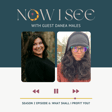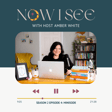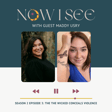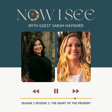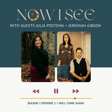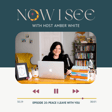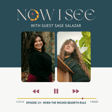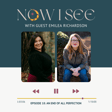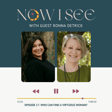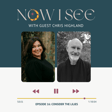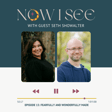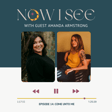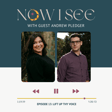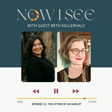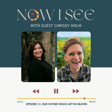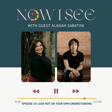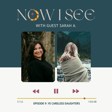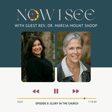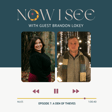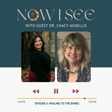Become a Creator today!Start creating today - Share your story with the world!
Start for free
00:00:00
00:00:01

Of Power, and Love, and a Sound Mind: Leaving Mormonism with Lyn Smith Gregory
It's hard enough leaving a high-control religion, but leaving when you're part of the well-known founding family comes with its own set of unique challenges.
In this episode, Lyn Smith Gregory (grand-niece of Joseph Smith, founder of the Mormon church) shares the powerful story of her leaving the Mormon faith and rebuilding her life.
More from Lyn:
Visit Lyn’s Website
Follow Lyn on Instagram
Follow Lyn on Facebook
Follow Lyn on LinkedIn
Links
Support the Podcast
Purchase Some Merch
Visit the Now I See Website
Follow Now I See on Instagram
Transcript
Introduction and Host's Intentions
00:00:01
Speaker
I was lost in utter darkness I was trapped in toxic shame I was bound by my religion Till I chose to break away Now I'm finding my true colors For the first time I feel free Now I'm learning self compassion And as I heal I'm finding peace
00:00:51
Speaker
Welcome to Now I See, eye-opening stories from the formerly faithful. I'm your host, Amber White, and here, me and my guests share our experiences in loving and leaving rigid faith systems. Together, we shine a light on the dark corners of these institutions and share the joys of rebuilding life on our own terms. I promise you'll leave inspired, even if you are a little teary-eyed.
Guest Introduction: Lynn Smith Gregory
00:01:25
Speaker
Hi, and welcome back to Now I See. I'm your host, Amber White, and today I am delighted to bring you a story from someone who left a faith we haven't discussed much on the show yet, the Mormon faith. And we're starting off our experience of hearing from folks who left this particular religion with a deep dive. Today's guest is Lynn Smith Gregory. Lynn grew up in Utah as one of nine children in a devout Mormon family. Her great-great uncle was Joseph Smith, founder of the Mormon Church. At 19, she left the church and moved to New York City, eventually obtaining an MBA from and NYU. After a 20-year career in the tech industry, she left to pursue writing full-time and has attended the Iowa Summer Writing Program
00:02:23
Speaker
and at the Bread Loaf Writers Conference. She now lives in Savannah with her husband. Lynn and I have a heartfelt conversation and I have a feeling you're going to want to learn more about her after the episode. I've added links to the show notes so you can follow her on social media and check for the release of her memoir on her website. This is a powerful interview and I don't want to spoil it one bit. So let's get into the episode.
00:03:10
Speaker
Hi, Lynn, and welcome to Now I See. It is a pleasure to have you on the show today. I am really excited about our conversation because your life experience is something that so many of us in the post faithful journey ah are dealing, that we're dealing with similar things. And I think that your insights are going to be really useful to the listenership. So thank you for sharing and for being with us today.
Lynn's Mormon Upbringing and Family Dynamics
00:03:39
Speaker
I'm excited to be here and I'm so happy to see that there are in existence today many places where people can find out that they are not alone and have support for their post-religious trauma experience.
00:03:58
Speaker
Hmm, me too, me too. I left 14 years ago, a fundamentalist Baptist background, and there wasn't as much 14 years ago as there is now. And so it's been really beautiful to see that grow and to see that there's more spaces. It's it's great. Well, I'd like to start by having you really set the scene for our listeners. What is your background? You have a very well-known origin, but I'd love to hear more about your experience growing up in the Mormon faith and with your family in particular. If you could kind of encapsulate that for us in a ah bit, that'd be great. Sure. Mormonism is, while it's a Christian-based religion or considers themselves Christian,
00:04:49
Speaker
it has a lot of distinctive qualities. And one of them is the intense isolation that Mormons experience by congregating and socializing with their own. There's an activity at the church every night. And in my situation, not only as a Mormon, but also as a Smith, related to Joseph Smith, the founder of the Mormon Church. ah My great-great-grandfather was Joseph Smith's younger brother and the first convert to the church, also the first missionary. And so there was, I call it Mormonism on steroids because there was a lot of attention paid to our family in Utah, knowing that we were related.
00:05:48
Speaker
Mormons uniquely value lineage as a way of elevating your status or importance in the church. And being able to claim bloodline connection to Joseph Smith was something that I felt like set me apart and made me special and something I was very, very proud of. So growing up, it was a very religion, religiously focused family. We knew from the the moment I woke up in the morning and my feet hit the floor that the most important job I had was to be a good girl and obey my parents, which felt like obeying God because
00:06:35
Speaker
I sometimes had a hard time distinguishing between the difference between my father's rules as the patriarch of the family and God's rules. To me, they almost seemed one and the same. It was such a powerful authority figure in the household who made all the decisions and ran the show. And it started out with morning prayers on our knees, around the kitchen table. And it just really was the primary um experience of my life. I believe we're all kind of held hostage to the earliest view of reality that we are indoctrinated with. And mine was all about saving my soul and making sure that I ended up returning to heaven, the highest ah level of heaven, most exalted state,
00:07:34
Speaker
And so I was very careful ah and felt a lot of guilt very early that I was not living up to Smith standards. And my father's mantra in the family was, you're a Smith, i.e. do better, I expect more, whatever. You're a Smith. And so that resonated throughout my childhood And I was a a complete believer.
00:08:08
Speaker
um It all made sense to me. And if I had any questions about, well, you know, how old are we in heaven and things that naturally come up when you're a child? I was told that was not my job to worry about and that what I was supposed to focus on was being obedient. And as a girl, there were no role models of women in leadership positions. So not only was I supposed to not ask questions, but to be quiet, sit down, ah put a smile on your face, be happy, and um be you obedient. And the underlying message was, don't think. We've done the thinking for you.
00:09:03
Speaker
you don't need to do that. So not only was critical thinking not encouraged, but in fact it was discouraged.
Questioning Faith and Leaving Mormonism
00:09:11
Speaker
So having grown up in that environment, I graduated a year early from high school and went off to college. ah I had graduated And it was too late to apply to Brigham Young University when I graduated early. And so I decided I'd spend a year at a state school and then transfer to BYU, which is a Mormon University. And in the course of that time at this non-Mormon University, I had a professor that I adored who I discovered was an atheist. And he discovered that I was a Mormon
00:09:54
Speaker
and also a firm believer and also um related to the prophet Joseph Smith. So he challenged me to defend my faith in his next semester's class. The Bible is literature and So that is what opened the door for me. I didn't begin questioning my religion until I decided I needed to bone up on all things Mormon and read the books that he might have read so I could refute any arguments that he had. And so in an attempt to better defend my faith, I didn't go home in between the semester and spent the week holed up in the library
00:10:43
Speaker
studying everything I could get my hands on, including books that had been forbidden to me to read. right And the first one was No Man Knows My History by Fawn Brody. And that is still one of the definitive biographies of Joseph Smith that exists. And suddenly I had a whole new way of looking at religion. She put it in the socioeconomic historical context for me that this was a religion that came out at a time of great religious ferment. And a lot of pop-up religions were happening. And it was at the turn of the century. And Joseph Smith's family believed in folklore and magic. And they had a history of having visions. so
00:11:39
Speaker
For Joseph Smith to suddenly report that he had a vision of Jesus and God appearing to him and telling him that he was going to be to restore the true one and only gospel to the church to the earth was something that wasn't outside the realm of crazy for his family. And for the time, there were a lot of self-proclaimed prophets appearing at that time. And I suddenly realized how this had evolved. Joseph Smith was also notorious among his neighbors for saying that he had the gift of being able to dispel
00:12:32
Speaker
um spells and fine buried treasure. And when I saw that he was a gold digger, and then now he comes up with the story that he found gold plates in the hillside very close to his family farm, which he called the Book of Mormon. And supposedly it's the ancient history of the predecessors to the Native Americans who supposedly were the lost tribes of Israel who had sailed to the North American continent and settled here. And he borrowed a lot of these facts from another book that he had gotten his hands on and read at the time. And I didn't know any of this beforehand.
00:13:28
Speaker
I didn't know he had been arrested and taken to court by his neighbors for falsely proclaiming, taking their money and not finding buried treasure for them. I suddenly, and these were court records, newspaper articles. and These were, these were scholars and historians who were presenting me with non-refutable facts. And my stomach just started to cramp and i it just I just got this sinking feeling that page after page was evidence that made sense to me, that was logical. And slowly over the course of that week, I realized
00:14:21
Speaker
how the Mormon Church had come about, how Joseph Smith became a self-proclaimed prophet. But I realized he was a con artist, a um a liar, a cheat, a womanizer. That was another thing that was very upsetting to me at the time. I believe the polygamy started with Brigham Young out in Utah, but I found that Joseph Smith, had actually come up with the revelation of polygamy ah years before and was practicing it actively for years before Brigham Young and he had in a very short amount of time married 41 women and some of which were already married to other men, friends of his. ah So it's polyamory really and then
00:15:19
Speaker
young girls as young as 14 years old. And this is a man well into his late 30s. And I was absolutely shocked and dismayed. And so I i kept reading and and somehow ah There was one more fact I remember is the library was about to close and I was reading about how Joseph Smith had become a Mason and he had borrowed Masonic rituals and used them as Mormon temple ceremony rituals. I had thought he had proclaimed them to be
00:16:05
Speaker
the ancient restored rituals from King Solomon's temples. But I found out by looking at side by side comparisons that these were identical to Masonic rituals. And that was the nail in the coffin for me. I don't know why, but I realized I didn't believe anymore. And I was shattered. But I couldn't unsee what I saw and what I understood to be true. I didn't know what to do with this. I could barely wrap my brain around it. So I kept it to myself. I didn't tell my family or friends, but I stopped going to church and church related activities. o And the church came looking for me. They sent the visiting teachers.
00:17:00
Speaker
who are people who come and check up on you and make sure you're doing okay. And if you haven't been to church, they want to know why. And I confess to them that I was a non-believer and they were shocked and dismayed because they knew of course who I was. and they didn't expect that, and I knew they would tell my parents. So I had to make a very hard phone call and tell my parents ah my feelings about the church. Very, very difficult call to make. I knew my mother would be devastated, and she was. In her mind, I was taking actions that would put me in utter darkness eternally.
00:17:49
Speaker
And that I was now the reason the family was not going to be altogether in heaven.
Family Reactions and Personal Struggles
00:17:55
Speaker
So there was a lot of guilt and she said, you know, she believed I would return to the fold. And it was a position honestly that she maintained for years. Quite active denial. And my father, who I was very close with, and he promoted me in the family as, this is an example of what happens. You were blessed with success when you were obedient and do as the commandments and the dogma tell you to. And so he was very disappointed in me. And losing that respect and regard was devastating.
00:18:42
Speaker
And my younger brothers and sisters, I was no longer someone who had any answers for them or suggestions for their lives. So losing their respect and being disrespected, ah they made assumptions about why I left. thinking that I had been tempted by Satan or I wanted to engage in um behaviors that were not allowed in the Mormon Church. you know No drinking, no smoking, no premarital sex, no swearing, no gambling. So it was really rough and this was before the internet.
00:19:20
Speaker
And so I felt very isolated and very much alone with my feelings and my experience. And I knew I couldn't stay in Utah that I would embarrass my family and bring shame to them. And so I moved sight unseen to New York City. Wow. Bold. Only at the ripe old age of 19 can you leave enough to do something like that. So true. And I thought that I would be like a snake shedding its skin that I could just shed my Mormon coat and emerge shiny and new with the new sense of self anonymous and free in New York City. And I discovered to my dismay that that was just simply not the case.
00:20:14
Speaker
that the ingrained ah tapes going through my head, the negative self talk about anything I did that was not within the confines of Mormon, approved Mormon behavior, brought an instant rush of shame and guilt. And at times I wondered, am I ever going to get past this? I intellectually understand it's not true, but my body and my emotions are so triggered by different events and things happening. And so it was a long process.
00:20:56
Speaker
And I stayed away both because my family kept me at arms length, but also because I didn't fit in anymore and I didn't have a role in the family. And my brothers and sisters who were younger than me were getting married and I couldn't attend their weddings because they were held in the Mormon temples and I wasn't allowed in. And they didn't understand why that felt very hurtful to me. And they're like, well, Why would you wanna go? you You're not a Mormon. and i And I wanted to say, well, usually weddings are inclusive events and all family and friends are welcome or invited and they didn't understand it. And I think being misunderstood was one of the hardest parts of the recovery process.
00:21:53
Speaker
yeah not being seen, ah being judged, being misunderstood. And no one asked me, what experiences did you have that made you decide to leave the church? right Because it didn't matter. I was wrong. There was nothing I could say that would justify leaving in their mind. So there was no point to have that conversation.
00:22:21
Speaker
So, you know, I stayed in New York City for 15 years. and I've never gone home again, other than for, I would go home for short visits and they were very challenging. um Mormon ah family Family events and Mormon events are very interconnected. You know, the weddings, the funerals, the birthdays, the baptisms, they're all Mormon events, Mormon ceremonies, rituals. And so I felt very estranged. But after quite a while, ah a decade or so, some of my younger brothers and sisters also left the church.
00:23:11
Speaker
Really? Yeah. And that created a schism in the family and a divide that put us into two camps, the apostates and the believers. And we were no longer a united family. it It was something we were so proud of, you know, that perfect Christmas card picture that you send out of everybody happy and smiling and unified. It didn't exist anymore. And that may have remained the case, except that there was something that happened. A family secret got told that shocked the whole family. And this led to the family agreeing that we needed to get some therapy as a family in order to heal this.
00:24:06
Speaker
wow I am so fortunate because I realize I'm an anomaly. It's unusual to have everybody in the family agree to do some therapy around family disconnection or estrangement. But they were willing to, mostly because we were all so upset about what had happened. And so once a year we would get together for three or four days and one day would be spent working with the trained facilitator to discuss the differences between these two groups. And in the course of doing that, we realized a few things. One that while
00:24:53
Speaker
Some concepts may have been beliefs at one point. We still retained our values that we were we were similar ah much more than we thought. you know I may not believe exactly what you believe, but my values are around life and people and how you treat each other have remained the same. And once we realized that, that helped a lot. We also learned how to talk to each other much more respectfully. We realized that there was absolutely no way to talk about religion or in our case politics either for that matter. all right That it was too divisive a subject and that what
00:25:40
Speaker
we needed to do is focus on what we had in common, finding common ground. So we did that. We were having kids then and we talked about what it felt like to be a parent and what it felt like growing up in the family in terms of family dysfunctional issues, you know, who was dad's favorite, ah who was mother's favorite, who got blamed, who was scapegoated, you know, these kinds of things. And then we, we learned how to spend three or four days together without it erupting into drama. That's remarkable. It is remarkable. And I feel incredibly fortunate because even though it's not perfect, sometimes it feels more fragile than at other times. Uh, there is a connection and we do see ourselves as a family once again.
00:26:38
Speaker
We are going on our first, the siblings are all getting together in February and going on their first out of the country family reunion or sibling reunion in Panama. And It's important. We decided that it's important to stay connected as a family and to try to be there for each other.
Healing and Family Reconciliation
00:27:02
Speaker
And that means respecting our respective journeys, even though they are not the same.
00:27:09
Speaker
That can be so challenging when you're talking about a faith that can lean into extremism so heavily, because there's a compulsion to bring those things up. Because if you don't believe those things, there are very severe consequences. And then it's tough on the the person who left side on your side of mine where you're like, you need to learn to respect me and leave me alone. And that's also a very big, emotional, powerful influence. So it really, I'm just blown away and really happy for you and for your family that you've been able to get professionals to come in and help you bridge those gaps because they are, they feel impossible sometimes. And sometimes they are impossible. That's true.
00:27:54
Speaker
I think there has to be a desire on both sides to find common ground. Whether it's, you know, you're having children, they don't want to be estranged from their grandkids or what, but there has to be some sort of motivation on both sides to find a way to to bridge the gap. And I think there was, in my family, um But like I said, we we've taken religion off the table as an item of discussion. It is not to be discussed, brought up, or referred to. And that's because I don't think that when you're in an absolute kind of faith, like a very extreme authoritarian or fundamentalist kind of religious situation,
00:28:48
Speaker
Truth is absolute and they have the absolute truth. So there's no room to compromise on that truth. Whereas in my case, I felt like, wow, there's lots of different ways to climb the mountain to God or ah or a spiritual path or a journey. And I was, I felt like we were much more inclusive because we said, well, maybe your path is Mormon, but some people's path is Buddhism or ah they're Muslim or they're Jewish or whatever. And all of those paths deserve respect. And that is not, of course, even though they may give lip service to respecting those various paths.
00:29:36
Speaker
They know in their heart of hearts that they have the one true faith. They have the secret. They have the inner knowledge. So it's just not something that can be talked about with any degree of constructive dialogue. I'm really amazed that both sides have come to that conclusion and have come to that agreement because I feel like in so many situations, there's one side or the other and it can go either way that's not willing to do that. And I'm curious if you agree that if that's the case, it might not be the best idea to move forward in mending right away.
00:30:17
Speaker
Right. And I don't think it it's appropriate to men right away anyway. I think we're too vulnerable right after leaving to try to mend fences.
Spiritual Journey and Parenting Insights
00:30:31
Speaker
I think it's really important to get your individual support, whether it's through a therapist like I did or a support group, which I wish it had available or both or a combination, a community. where you feel supported and not alone. And then you have to evaluate the situation carefully and ask yourself, is this going to be harmful to me? Is this going to be a toxic relationship? Or is there a place for respectful dialogue? yeah And if it's not, I wouldn't pursue it.
00:31:14
Speaker
A question I think of a lot too is, am I ready even if it is that way? I agree. That's a great question. yeah And I think I expected to be ready way before I was. It took years to unpack and feel like I had some distance enough distance not to be triggered um by family behavior and statements, et cetera. Yeah. I like to remind folks that have recently left her only a few years out of leaving that it took me 13 years to start this podcast. And that's over, that's well over a decade. And it took that long for me to feel comfortable and ready. And like I was in a place where I could do it. It took me decades to decide to write my memoir. Yeah.
00:32:09
Speaker
It's okay. It's okay. I think like you and I left, I very much was like, Oh, by next year I'll be assimilated into normal society. I won't have any problems. I'll be just as normal as ever. Like it never happened. And that is the biggest lie I've ever told myself and ever believed. Um, i but yeah, but the journey is remarkable in and of itself. And I would love to hear if you wouldn't mind to expand a little bit more. on that journey from, oh my goodness, my world is being turned upside down and where you are now. Well, I blame my age, but I i was so young, 19, when I left that, you know, when I thought that when I discovered that the Mormon Church was a fraud,
00:33:00
Speaker
And I said, well, maybe this whole idea of God is a myth as well. And I kind of threw the baby out with the bathwater and became a true blue diehard atheist. And I was not going to be duped ever again. I was going to believe in science and things that could be proven. And people who believed in God were just people who couldn't face reality. And I felt sorry for them. And so it was a very judgmental, limiting position. And it didn't bring me happiness. And it didn't answer any questions. And I had a lot of questions after the certainty of Mormon answers for everything. Suddenly, I didn't know anything
00:33:50
Speaker
Were there any rules? What were they? And was this just sort of a random universe, an experiment, and we're just specks of dust spinning through the universe? Is there any meaning to this whole experience? Why are we on the planet? And I didn't have answers, and that led me to a really dark place. ah I just felt an abyss of darkness and I was very fortunate. I had a spiritual experience. I had a moment of ah really what I call grace where I realized that there was something bigger than me in the universe. And I'm reluctant even now to call it God because that word has connotations for it, but whether you want to
00:34:43
Speaker
refer to it as source or creativity or energy or love. I like the divine. Yeah. Einstein said there's the most important decision we ever make is whether we believe the universe is friendly or hostile. And I believe it's friendly. Yeah. And so I believe there is a friendly energy that's very much about love. that we are hardwired for God. We are hardwired to believe in are the best of our humanity and to make connections with others from that place of love and altruism and just human decency.
00:35:31
Speaker
yeah And that is what I think of. You know, i I know the Dalai Lama said kindness is my religion and I can really identify with that. We can all be a little bit kinder. So I moved from my position as an atheist to one of a spiritual seeker and that open the door for other kinds of healing modalities. For example, I learned to meditate and I got into yoga so I was connecting my mind body and finding stored trauma in my body and ah breath work as well as
00:36:18
Speaker
really being fortunate enough to marry a man who anchored me and was not the patriarchal father that I grew up with. He was very much a partner. And that really ah was very healing so that I was in a different position when I had my children, you know, about how I wanted to raise them, which is such a gift. it is yeah Breaking generational trauma and breaking generational patterns of limitation.
00:36:54
Speaker
I resonate with that a lot right now. Our listeners do know that I am 20 weeks pregnant. They found out in our last episode and I am resonating so much with the things that you're saying. We've talked a lot on this podcast about the importance of connecting with your body after leaving high control religion because I think one of the first things that they do is try to separate you from your body and your emotions and your feelings because they aren't trustworthy. Right. That's right. Don't trust your debt. That's right. Because it'll lead you astray, as will your heart. Right. It's very interesting. Then follow me the leader.
00:37:32
Speaker
I have all the answers. Exactly. Exactly. Go with the group. We've got this ah locked in for you. You don't even have to think about it. um And so they do a really good job of separating you from that. So I love that you brought that up because I always encourage our listeners to find ways to connect with their body. And it's it's hard. I even now, 14 years out, really struggle sometimes to connect. Stay in your body. and experience all your emotions and feel them in your body at the time that they're happening. yes yeah The first couple of times I did yoga, I started crying. yeah i i It wasn't it expected it at all, but just that gentle way of looking at getting into your body and and not being in your head was
00:38:29
Speaker
revel revelatory for me. who It feels so good. yes It's such a freeing experience to realize you don't have to hold everything in this controlled space, right? It's it's really freeing to let that go and feel it move through you. think Thinking yes, yes, exactly And I think about this a lot now that I'm thinking about having children The listeners don't know but we discussed a little bit how glad we are that we waited a while to have children before we were in these healthier places and I think the thing that brings out tears in me the most which a little easier now that I'm pregnant but I is thinking about how different my husband and I will treat parenthood and will treat our child compared to the generations before us. And that is really moving to me and it's powerful and it is healing things that I did not know. Still were there, wounds that were still there. um And it's it really is a beautiful experience to realize that absolutely you did it. You're doing it and you're trying.
00:39:39
Speaker
Yes, exactly. I think that's really probably one of the most significant aspects of recovery is being able to do things differently and having the spaciousness to act from a different place. Yep. Something I also find myself overwhelmed by, and I'm curious if you have too, is ah gratitude. I have moments where I am so physically and emotionally overwhelmed with gratitude for what my life looks like. I also have a husband who's not patriarchal in any sense of the word and who's very supportive and is a partner. And even in and just our everyday lives, I find myself just overcome with how grateful I am that what I thought could be true is actually true and is actually attainable and is is mine to have.
00:40:38
Speaker
which is really beautiful. That's beautiful. And I couldn't agree more. That's the very first thing I think of when I open my eyes in the morning is how grateful I am to be alive, having this incredible experience of being on the planet and healthy and grateful for my body that moves and and grateful for the fact that I'm not struggling to find enough to eat or keep a roof over my head. I mean,
00:41:17
Speaker
And then, you know, when you wake up and you start your day off with gratitude, you just pay attention to life in a different way. And you hear the birds singing and you notice them and you're grateful for them. And, Oh, you know, this tree has started to bud and isn't that incredible. Uh, Another quote that I love from Einstein is, there's only two ways to look at the world. Either everything is a miracle or nothing is. Hmm. That is ah really good. Yeah. And I really, I really, really believe that yeah the whole thing is a miracle to me. And even though I don't have definitive answers in
00:42:07
Speaker
and I certainly wouldn't have answers for anyone else, I'm no longer actively searching for the right way or a religion or a path. I'm very content to be where I'm at, just in a state of of deep gratitude for my life and the gifts in my life. And I try to embrace everything that happens in my world with acceptance and not resist what is what is. A, it already is. So resisting what already is is insane. But also, you know, I just trust the universe in a way that I wasn't capable of trusting it before.
00:43:02
Speaker
And that's only after years of therapy in self-work and doing a lot of excavating and healing. yeah It does take time. This must come up every other episode. It takes so much more time than you think and I spent a very long time feeling behind and like it was never gonna happen and I was always gonna be discontent and frustrated and you know slowly but surely the work is done and you get comfortable with it being ongoing
00:43:44
Speaker
And it is a process and I love that you have brought that up a few times because it's such an important reminder.
Lynn's Memoir and Resources
00:43:51
Speaker
that it's a journey, it's a long journey. yeah m And I think, especially when I was very young, I left at 21, similar, not not too long from 19. And I i just should remember thinking, it all has to happen right now because I'm getting older. And I had no idea how much time was really ahead of me and how great it could be to let it take its time. It's great. Exactly. Yeah.
00:44:19
Speaker
And you have written a memoir about your experiences, correct? Yes, it's a story of me, primarily, but also my sister. I can't tell my story without telling my sister's story because it's the story of of two contrasting lives. My sister was a rebel. And at 14, she just started acting out in the most outrageous ways. And by the time she was 17, my father kicked her out of the house oh and basically washed his hands of her.
00:45:01
Speaker
And she was left to her own devices. that She and I were only 15 months apart and had been very close, even though she was a much more rebellious and had a lot more courage than I did. She was she was just absolutely defiant. So the my memoirs about both of us exiting the Mormon Church, albeit in very different ways. ah Me and I went to New York, she went to San Francisco, but we stayed connected. And it it it shows the trajectory of both of our lives because we made different choices and what happened as a result of the decisions that we made and what we decided to embrace and what we could discard and what we couldn't.
00:45:54
Speaker
Hmm, that's really interesting. I can't wait for it to be published and for it to come out. Thank you. It's, it's out there to publishing companies right now. And we're hoping that we'll find a home for it in the next couple of months. Well, listeners can expect that when it does find a home and it's in print, that it will be in the bookshop for the show and we'll all be able to read it and looking forward to that. And congratulations on writing it and getting to this point. Yeah, i I started it because my sister and I both kept journals and she shared them with her journals with me. And I wanted to see, I wanted answers to questions and I had the journals and going back over them, I started to write down my thoughts and it turned into a memoir. That's amazing.
00:46:47
Speaker
I love resources. I love when there are books, podcasts, things that we can connect to. And I think that'll be a great one for folks who are on similar paths. um And I'm curious if there are other resources that have helped you in your journey that you would recommend to our listeners. Yeah, I have a few favorites. I think the work of John Bradshaw, who is probably the father of family ah therapy.
00:47:19
Speaker
ah Any of his books are wonderful to understanding dysfunction and helping provide, learn tools and skills that can help you navigate that minefield. ah One of the first books I read that put me in touch with my deep childhood wounds of my upbringing was Alice Miller's book, The Drama of the Gifted Child. And it's a very small book, but it basically helped me see that I had never really addressed the fact that
00:48:03
Speaker
I did not get the kind of ah mother or father that all children deserve. And and i I remember crying as I read the book because I for the first time could imagine what would it have been like to have had my emotional needs met. yeah So that instead of judgment and right and wrong, and that being the focus and the emphasis, but just an exploration of my feelings and acceptance. And I mean, it broke my heart to think about ah how damaged we are as children, ah innocent children.
00:48:56
Speaker
ah be not intentionally, but our parents, you know, are wounded. Like I said, we've got four generations of people locked into unhealthy patterns of behavior. And so that was really eye opening for me. And it broke through my denial because I was in denial. I had intellectualized. It wasn't that bad. you know, right ah the same way I had done the I can get over this quickly, shed my Mormon costume and suddenly be a normal person. And um other books, I think, you know, it depends on
00:49:42
Speaker
on your experience. I love Martha Beck's book, Leaving the Saints. And it's her story of leaving the Mormon church. ah And she's a columnist for Oprah magazine. She's written. ah She's a ah life coach and an author. She wrote The North Star, Follow Your North Star. And her ah book was one of the first that was similar to my own experience, my own story. And so it was very helpful to have somebody suddenly define spirituality outside a religious context. And that was helpful to broaden my mind and help me
00:50:31
Speaker
um be open to the idea that there was something ah bigger than me that existed in the world, in the universe, in our experience of life. That's a powerful realization to have. ah So many, but I think on my website, one of the things I plan to do is have a list of books that were helpful to me and books that I think resources
00:51:02
Speaker
that are helpful. um And there are just so many more now ah than there were when I was coming out of Mormonism. Yeah. For the listeners, the website will be linked in the show notes as well. So you can connect with Lynn there and be on the lookout for those resources as well. Lynn, this has been a really great conversation. I have enjoyed spending the last hour with you and I just appreciate the work that you're doing and the stories that you're sharing. They're so powerful and important.
Emphasizing Personal Autonomy
00:51:43
Speaker
um I think
00:51:45
Speaker
I think it's a beautiful thing that people can learn from your experience when they're going through the same thing. um So thank you for doing that. And thank you again for being here. Well, thank you so much, Amber, for having me. um Like you said, the work that you're doing, you know, making ah people feel supported and seen and heard and understood is so vital. to the recovery process. So thank you for the good work that you're doing.
00:52:20
Speaker
I say this a lot, but it truly is one of the great joys of my life that I get to do this show. So, thank you. I have two last questions to ask you. I ask them to every guest, and I'm very interested to hear your answers. ah The first is, what is something you see clearly now that you didn't see before when you were the most immersed in your faith? I think what I see clearly now is that there is no substitute for my own opinion or own judgment. There is no substitute for that. And
00:53:04
Speaker
At the time, I was so willing to give away my autonomy and and understanding of a situation to a higher authority. And now, I would never do that. I value my own opinion and assessment of a situation, of a person, of an experience. And I would never want to trade that again for being right or perfect in some sort of religious context.
00:53:39
Speaker
Yeah, I feel very similarly the freedom to be able to make my own choices was a huge driving factor in me leaving for good. And once I had a little taste of that, it was not going back. So it's such a freeing feeling and such a good feeling to know that you don't have to give up your autonomy to truly live a great and blessed even. life. Last life. Yes. Yep. And our last question of the day is my absolute favorite and it's what are some of the greatest moments of joy that you've experienced while rebuilding your life post faithfulness? I would have to say it's been the experience of parenting differently.
00:54:33
Speaker
I honestly really recognized in as I was doing it because I waited to have children that I was in some ways parenting myself all over again by providing my, my children with a safe, nurturing, nonjudgmental space to be all of themselves, uh, was incredibly healing for me.
00:55:05
Speaker
And it gave me so much joy to see how they thrived in it and to know that this is who we are. You know, before we get messed up, we're these perfect little creatures and um that if we just don't mess with it, and allowed allow children to be validated for who they are and seen and and understood that it just can be a very different experience of life. And I see that with my children.
00:55:43
Speaker
They're very happy and well adjusted. And even though I'm sure one day they'll go into therapy because we're never perfect parents. And that's okay too. Perfection is not the goal, but doing better than um what was given to us is a way of changing that, breaking the chains, breaking the cycle.
Conclusion and Gratitude
00:56:10
Speaker
It is. It starts. It starts somewhere and it grows right and it gets better. And i I hope my children will feel like they can go to therapy about me if they need to. I support that wholeheartedly.
00:56:27
Speaker
Feel free to throw me under the bus. I messed up. Do it and we'll address it and know and I will apologize. And on my part, exactly. Yes. Yes. That's wonderful. I love hearing that, especially as a soon to be parent to a little one. I love hearing that that's been a great joy for you because I am anticipating it being a great joy for me too. And, you know, also ah having grown up as someone who the whole concept of self-love was completely for it.
00:57:03
Speaker
It didn't even exist in the dictionary of terms in my world. And to realize that ah learning to love myself is such a positive thing and not something that that is related to being boastful or a bragger or ah delusions of grandeur, that true self-love is an incredible experience to have. yeah And I wouldn't have had it if I had stayed in the confines of that religion. It's true. It's true. Well, Lynn, thank you again for being here and for sharing so openly about your experience and the things that you have been through and the way that you and your family are working.
00:57:54
Speaker
through some of this trauma together. It's really powerful. And I am very moved by the work that you all have done, um but especially you. I'm sitting here with you um to make these changes, positive changes for your lives. And I'm grateful to get to be a listener. Thank you so much for having me. Delighted to be here and delighted to get to know you and learn a little bit more about your experience as well. oh Well, thank you. And we'll be wishing you all the best, me and the listeners from here on with your book. And I hope to hear an update on it sooner than later. Thank you. And all the best in your new journey as a mom. Thank you.
00:58:50
Speaker
Thank you for tuning into this episode and being on this journey with me. You can find resources and links in the show notes. If you're enjoying the show, please subscribe, rate, and review, and follow along on social media to help us grow. Now I See is independently funded by me. If you'd like to help support the show, you can donate directly or purchase a merch item on the website. Music for this episode was made by Alana Sabatini, a former faithful and talented musician. And finally, this podcast is made possible by the incredible team at Softer Sounds, a feminist podcast studio for entrepreneurs and creatives providing technical skill with tender support.
